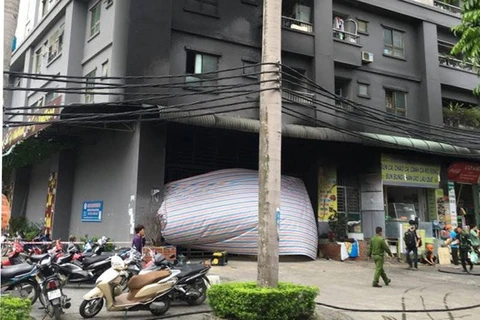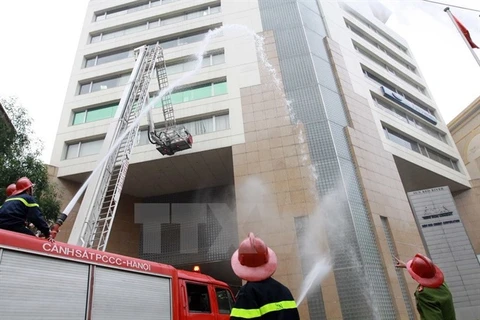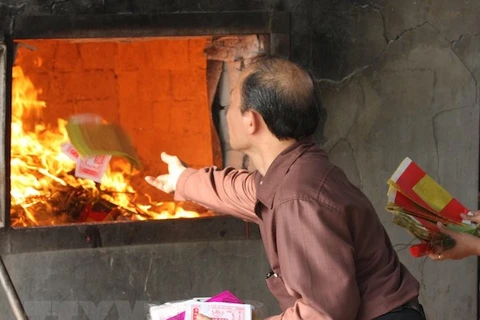Singapore (VNA) – Burning votive papers is an important practice in the spiritual life of Singaporean people as over 70 percent of the population are of Chinese origin, and the country has tightened management to prevent negative impacts of this practice like wastefulness, fire and environmental pollution.
On the first days of the Year of the Dog, many Singaporeans have come to Kuan Yin Temple at the Bugis area to pray for good fortune. However, instead of burning votive papers or displaying wasteful offerings, local people only buy joss sticks and flowers sold at the pagoda gate to offer to the Buddha. Stores of offerings also sell only joss sticks, flowers and candles.
A store owner said burning votive papers at the pagoda has been prohibited for a long time, and pagoda-goers only burn joss sticks and offer flowers to pray and show respect for the Buddha.
At the Buddha Tooth Temple, the biggest pagoda in Singapore that is located in the vibrant Chinatown district, locals offer only joss sticks, flowers and candles. They completely do not burn votive papers or offer sophisticated offerings.
Peter Low, a resident in the district, said after a fire 15 years ago, the Singaporean Government banned setting off firecrackers and curbed the burning of votive papers to prevent fires and protect the environment and people’s health. At present, pagoda-goers are only allowed to burn three joss sticks and completely not burn votive money and offerings.
Over the last decade, the Singaporean Government issued concrete and strict regulations on the burning of votive papers. Accordingly, this practice is prohibited at Buddhist pagodas. At temples of gods and residential areas, people have to burn votive papers at designated places.
Singaporeans usually burn votive papers at Ullambana Festival on the 15th day of the 7th lunar month. On this occasion, aside from the designated places, many steel boxes are also added to serve the votive papers burning.
Statistics of Singaporean agencies show that the country used to import over 20 million SGD (about 16 million USD) worth of votive papers each year. The figure has declined in recent years thanks to the curb on votive papers burning.-VNA
On the first days of the Year of the Dog, many Singaporeans have come to Kuan Yin Temple at the Bugis area to pray for good fortune. However, instead of burning votive papers or displaying wasteful offerings, local people only buy joss sticks and flowers sold at the pagoda gate to offer to the Buddha. Stores of offerings also sell only joss sticks, flowers and candles.
A store owner said burning votive papers at the pagoda has been prohibited for a long time, and pagoda-goers only burn joss sticks and offer flowers to pray and show respect for the Buddha.
At the Buddha Tooth Temple, the biggest pagoda in Singapore that is located in the vibrant Chinatown district, locals offer only joss sticks, flowers and candles. They completely do not burn votive papers or offer sophisticated offerings.
Peter Low, a resident in the district, said after a fire 15 years ago, the Singaporean Government banned setting off firecrackers and curbed the burning of votive papers to prevent fires and protect the environment and people’s health. At present, pagoda-goers are only allowed to burn three joss sticks and completely not burn votive money and offerings.
Over the last decade, the Singaporean Government issued concrete and strict regulations on the burning of votive papers. Accordingly, this practice is prohibited at Buddhist pagodas. At temples of gods and residential areas, people have to burn votive papers at designated places.
Singaporeans usually burn votive papers at Ullambana Festival on the 15th day of the 7th lunar month. On this occasion, aside from the designated places, many steel boxes are also added to serve the votive papers burning.
Statistics of Singaporean agencies show that the country used to import over 20 million SGD (about 16 million USD) worth of votive papers each year. The figure has declined in recent years thanks to the curb on votive papers burning.-VNA
VNA























